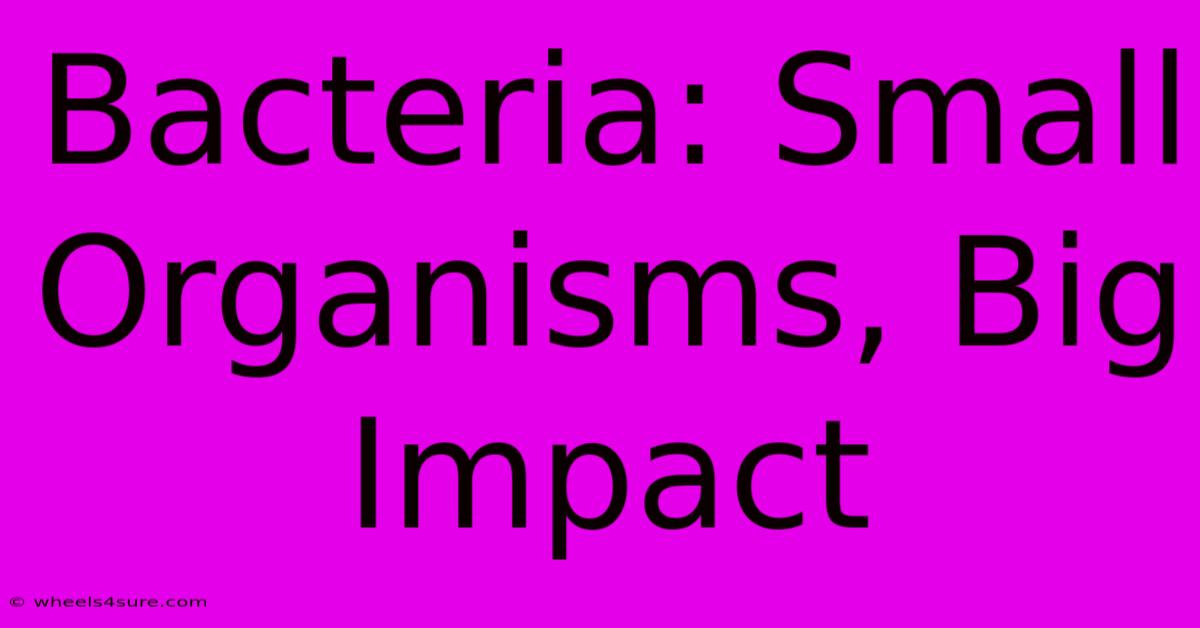Bacteria: Small Organisms, Big Impact

Table of Contents
Bacteria: Small Organisms, Big Impact
Bacteria. The word itself might conjure images of illness and disease. While it's true that some bacteria are pathogenic, causing infections and illness, the vast majority are harmless, and many are even beneficial to humans and the environment. These microscopic organisms play a crucial role in nearly every ecosystem on Earth, impacting everything from human health to global climate change. Let's delve into the fascinating world of bacteria and explore their surprisingly significant impact.
The Ubiquitous Nature of Bacteria
Bacteria are single-celled prokaryotic organisms, meaning they lack a membrane-bound nucleus and other organelles found in more complex eukaryotic cells. Their simplicity, however, belies their incredible diversity and adaptability. They are found virtually everywhere: in soil, water, air, and even inside other living organisms, including humans. These tiny powerhouses are incredibly resilient, thriving in extreme environments like hydrothermal vents and acidic hot springs.
Bacterial Habitats: A Diverse World
- Soil: Bacteria are essential for nutrient cycling in soil, breaking down organic matter and releasing nutrients plants need to grow. They also contribute to soil structure and fertility.
- Water: Aquatic bacteria play a crucial role in the decomposition of organic waste and the cycling of essential elements like nitrogen and phosphorus. They are also a vital part of the food web, forming the base of many aquatic ecosystems.
- Human Body: The human body harbors trillions of bacteria, collectively known as the microbiota. These bacteria are essential for digestion, nutrient absorption, and immune system development. A healthy balance of gut bacteria is crucial for overall health.
- Extreme Environments: Some bacteria thrive in extreme conditions, such as high temperatures, high pressure, or high salinity. These extremophiles are of particular interest to scientists studying the limits of life and potential for life beyond Earth.
The Beneficial Roles of Bacteria
While the negative effects of pathogenic bacteria are well-known, it's crucial to understand the enormous benefits bacteria provide:
Environmental Benefits:
- Nutrient Cycling: Bacteria are vital in the nitrogen cycle, converting atmospheric nitrogen into forms usable by plants. This process is crucial for plant growth and overall ecosystem health. They also play a critical role in the carbon cycle, breaking down organic matter and releasing carbon dioxide back into the atmosphere.
- Waste Decomposition: Bacteria are the primary decomposers in many ecosystems, breaking down organic waste and returning nutrients to the environment. This process is essential for maintaining ecosystem health and preventing the build-up of waste.
- Bioremediation: Certain bacteria can be used to clean up environmental pollutants, such as oil spills and industrial waste. This process, known as bioremediation, offers a sustainable and environmentally friendly way to address pollution.
Human Benefits:
- Food Production: Bacteria are essential for the production of many foods, including yogurt, cheese, sauerkraut, and pickles. They are used in fermentation processes, which enhance the flavor, texture, and shelf life of these foods.
- Medicine: Bacteria are used in the production of antibiotics and other pharmaceuticals. They are also being explored as potential therapeutic agents for a variety of diseases.
- Industrial Applications: Bacteria are used in various industrial processes, including the production of enzymes, biofuels, and other valuable products.
The Impact of Pathogenic Bacteria
Despite their numerous benefits, some bacteria are pathogenic, meaning they can cause disease in humans and other organisms. These bacteria produce toxins or other harmful substances that can damage cells and tissues. Understanding the mechanisms of pathogenesis is crucial for developing effective treatments and preventative measures.
Common Bacterial Infections:
- Strep throat: Caused by Streptococcus bacteria.
- Pneumonia: Often caused by Streptococcus pneumoniae or other bacterial species.
- Tuberculosis: Caused by Mycobacterium tuberculosis.
- Food poisoning: Caused by various bacteria, such as Salmonella and E. coli.
Conclusion: A Necessary and Complex World
Bacteria are incredibly diverse and play a crucial role in maintaining the balance of life on Earth. While some bacteria cause disease, the vast majority are harmless or beneficial. Understanding the complexity of bacterial biology is essential for addressing both the challenges and opportunities presented by these microscopic organisms. From environmental stewardship to medical advancements, our relationship with bacteria is intertwined and profoundly impactful. Further research into bacterial diversity and function will continue to unveil their significant contributions to our world.

Thank you for visiting our website wich cover about Bacteria: Small Organisms, Big Impact. We hope the information provided has been useful to you. Feel free to contact us if you have any questions or need further assistance. See you next time and dont miss to bookmark.
Featured Posts
-
Evangelos Marinakiss Financial Empire An In Depth Look
Apr 03, 2025
-
Kai Watts Stepping Into The Limelight
Apr 03, 2025
-
Jack Vettrianos Net Worth Is It Public Knowledge
Apr 03, 2025
-
The Unexpected Life Of Louis Therouxs Son
Apr 03, 2025
-
The Future Of Football Andy Reids Sons Impact
Apr 03, 2025
